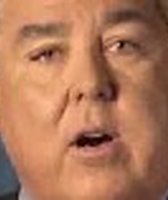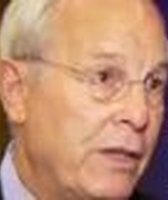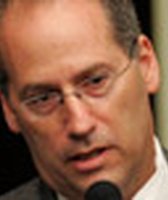Get PolitiFact in your inbox.
John Morgan says 'nobody's addicted' to marijuana
High-profile Orlando attorney John Morgan is leading an effort in Florida to legalize medical marijuana, arguing that the drug is safer and cheaper than other painkillers.
As a recent guest on Bay News 9’s Political Connections, Morgan also discussed whether marijuana is addictive.
"Nobody's addicted to it," Morgan claimed.
We decided to fact-check Morgan’s claim based on input from readers. But we didn’t have to dig too far. Morgan told us he was wrong.
"It was a huge mistake," said Morgan. "I’m sorry and embarrassed I messed up."
Morgan said he was "flat out wrong" about marijuana not being addictive and meant to focus on the use of the drug compared to more potent painkillers.
"Some levels of addiction kill you -- marijuana may make you slow, but it will never kill you," said Morgan, a personal injury attorney who is leading the group People United for Medical Marijuana. The group has launched a petition drive to add an amendment to the state’s Constitution to legalize medical marijuana in 2014.
Even though Morgan said he made a mistake, we were curious enough to check a few more sources.
Aaron Norton, a psychotherapist who specializes in addictive disorders, said that "cannabis dependence is a diagnosable disorder."
"Not everyone who uses it becomes addicted," said Norton, but some are more vulnerable, including people with mental disorders, adolescents and young adults.
Featured Fact-check
"In the course of my career, I have probably treated hundreds of patients who are cannabis-dependent, and many of them also met the two diagnostic criteria associated with physiological dependence -- tolerance and withdrawal," Norton said.
Marijuana abuse is recognized as cannabis-use disorder in the American Psychiatric Association’s Diagnostic and Statistical Manual of Mental Disorders. The manual’s list of symptoms include craving; taking larger doses over a longer period of time than intended; recurrent use that results in failure to fulfill major obligations at work, school or home; and tolerance (needing more to get the desired high).
It’s also described as an addictive substance by the government-funded National Institute on Drug Abuse, which writes: "Estimates from research suggest that about 9 percent of users become addicted to marijuana; this number increases among those who start young (to about 17 percent, or 1 in 6) and among daily users (to 25-50 percent)."
Psychiatrist Dr. Darren Rothschild, an addiction medicine specialist, says he’s worked with patients who have developed a serious dependence on marijuana and "the impact is substantial."
"In order to feel normal, they have to have the drug," Rothschild said. "Not everyone who smokes becomes addicted, but it’s erroneous to say it doesn’t happen."
Rothschild said people who smoke marijuana daily over a long period of time are the ones most susceptible to dependence on marijuana versus intermittent smokers who may occasionally smoke pot at a party. "I’d say none of those people are addicted."
Dr. Samir Sabbag, assistant professor of psychiatry and behavioral sciences at the University of Miami Miller School of Medicine, Division of Alcohol and Drug Abuse Treatment and Research, said "long-term use of marijuana is indeed addictive," though he noted people can be addicted to a variety of things, including the caffeine in chocolate and coffee.
Even groups that support relaxing marijuana laws, such as the National Organization for the Reform of Marijuana Laws (NORML), concede that Morgan was incorrect to say that marijuana is not potentially addictive.
"Can people have an abusive relationship with marijuana? Absolutely," said NORML executive director Allen St. Pierre. But St. Pierre says marijuana is "not addictive in any way shape or form the same way that alcohol, nicotine and other legal and illegal drugs, even caffeine, can cause serious withdrawal."
Our ruling
Orlando attorney John Morgan said that "nobody’s addicted to" marijuana. Morgan quickly admitted that he was wrong, and experts agreed.
We rate the claim False.
Our Sources
Bay News 9 show, Political Connections, Sept. 22, 2013
Phone and email interview, Aaron Norton, Largo psychotherapist specializing in addiction disorders, Sept. 30, Oct. 1, 2013.
Phone and email interviews, Dr. Samir Sabbag, assistant professor of psychiatry and behavioral sciences at the University of Miami Miller School of Medicine, Division of Alcohol and Drug Abuse Treatment and Research, Oct. 4 and 5, 2013.
Phone interview, Allen St. Pierre, executive director, NORML and The NORML Foundation, Oct. 1, 2013.
Email, Paul Armentano, deputy director, NORML, Oct. 3, 2013
Phone interview, John Morgan, law firm Morgan & Morgan, Oct. 2, 2013
Phone interview, Darren Rothschild, Palm Harbor psychiatrist and addiction medicine specialist, Oct. 2, 2013
National Institute on Drug Abuse website, Oct. 1, 2013
Scripps Research Institute website: "Scripps Research Scientists Find Anticonvulsant Drug Helps Marijuana Smokers Kick The Habit," April 24, 2012
National Academy of Sciences Institute of Medicine’s "Marijuana and Medicine: Assessing the Science Base," 1999.
The American Psychiatric Association’s "Diagnostic and Statistical Manual of Mental Disorders," 2013.
Miami Herald, "John Morgan, Obama Fundraiser and Crist boss, to lead medical-pot initiative in Florida," March 15, 2013
Browse the Truth-O-Meter
More by Rochelle Koff
John Morgan says 'nobody's addicted' to marijuana
Support independent fact-checking.
Become a member!
In a world of wild talk and fake news, help us stand up for the facts.





































